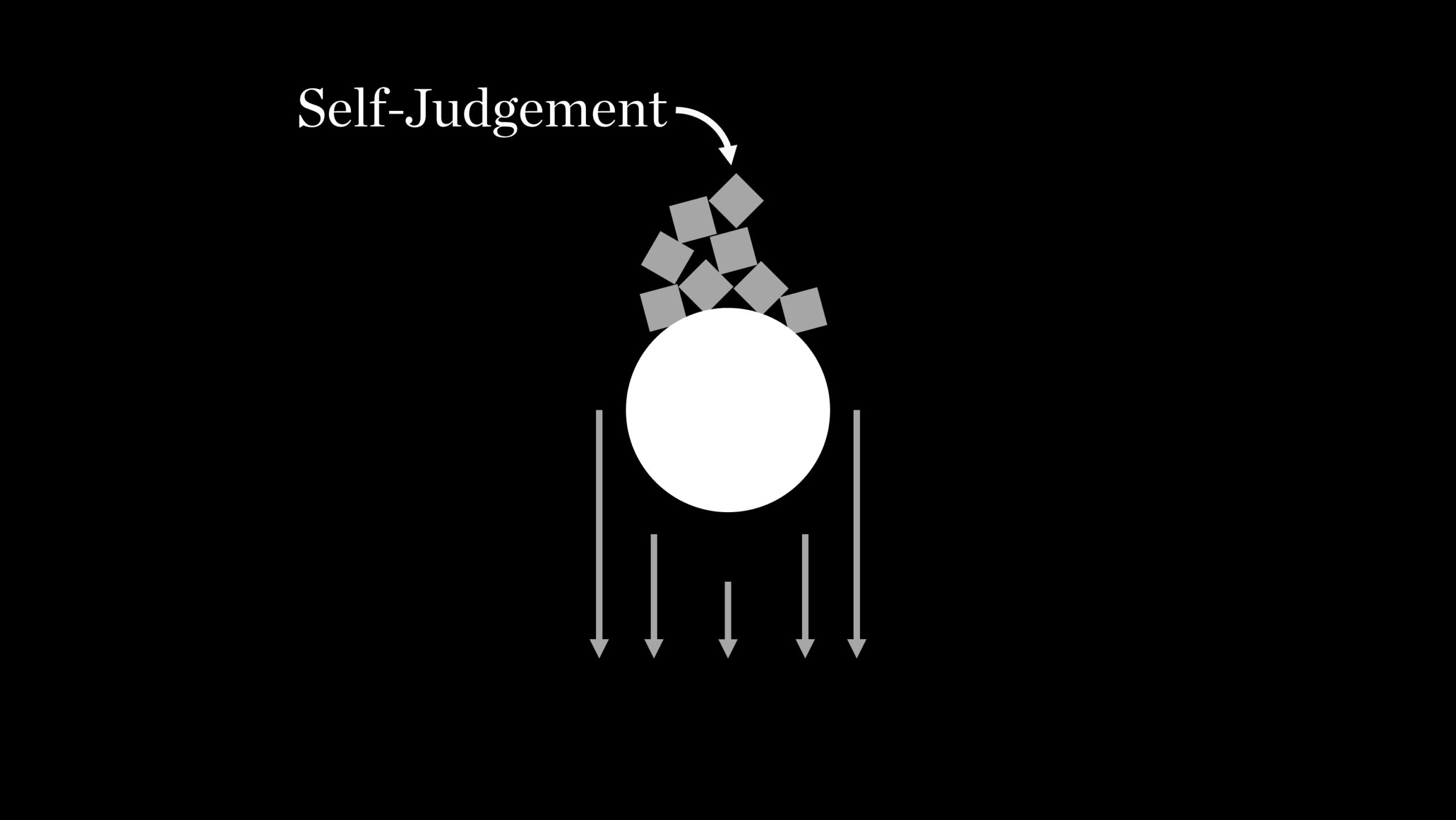Article last updated on January 28, 2023
We all experience self judgement. It’s something we can’t always explain or understand—something that lies beneath the surface, hidden in our subconscious. But why? What is it about self-judgment that leaves us feeling so powerless and unable to move on with our lives?
It may be hard to believe, but if you’re willing to delve into the depths of your own experience, there are ways to demystify this mysterious force.
To unlock its secrets and free yourself from its grasp in this article, I’ll take a deep dive into what self-judgment really is, how it affects us, and most importantly, how we can begin to unravel its power over us.
What Exactly Is Self-Judgement?
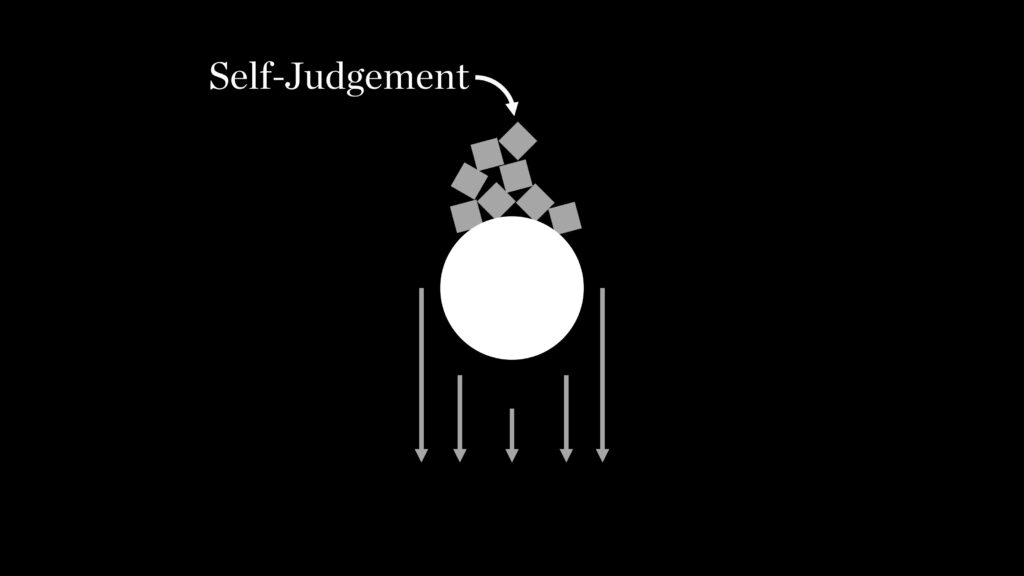
Self-judgement is like an albatross around our neck, weighing heavily and dragging us down into a murky abyss of self-doubt.
It can be hard to even put into words the negative self-judgments that run through our minds on any given day, but it’s something most of us struggle with at some point or another.
To understand what we’re up against when it comes to self-judgment, let’s look at the judging mind—that part of our consciousness that judges everything as good or bad.
We are so used to living in this dualistic framework that we often forget there is anything beyond judgment, a more compassionate mind that doesn’t require us to label and judge ourselves before we can understand who we are.
We all experience moments where our inner critic takes over and causes us to focus negatively on ourselves; however, if we step back for a moment and observe these thoughts without attaching judgment, then we can start to gain insight about their root cause and move towards cultivating a nonjudgmental attitude towards ourselves.
With self-awareness, compassion, and patience, it is possible to break out of the cycle of judging yourself and make room inside for real growth.
How can I become more aware of my own self-judgement?
You need to start by recognizing when your inner critic starts to take over.
In other words, pay attention to those moments where you find yourself questioning every single decision you make or feeling like nothing you do is good enough.
This could be anything from obsessing over whether or not people will approve of what you wear to spending hours analyzing why someone didn’t respond to your message right away.
Satire creates imagery in the audience’s mind; imagine a carousel filled with voices telling you that everything you do isn’t nearly as perfect as you think it should be, regardless of how much effort went into it.
To combat this type of internalized criticism, try engaging in some positive self-talk and reminding yourself about your successes and strengths rather than dwelling on perceived failures and flaws.
Make sure to also challenge any irrational beliefs head-on instead of simply accepting them without question.
Finally, practice mindful awareness techniques such as breathwork and meditation to gain insight into why certain emotions arise during times when judgment seems particularly strong.

It can be difficult at first, but gradually becoming aware of your own self-judgement can help bring forth greater clarity and understanding into why we often feel weighed down by these kinds of negative thought patterns.
Taking small steps towards learning how to observe our reactions without allowing them to dictate the course of action allows us to move past these barriers while gaining strength along the way.
Understanding the Root Cause of Self-Judgement

Like a game of whack-a-mole, understanding the root cause of self-judgment is essential before we can attempt to reduce or eliminate it.
Drawing on both social sciences and mindfulness based attention in relation to this topic, there seems to be one common thread: the idea that perfectionism may play a role in how we perceive ourselves and others.
This means that when faced with an obstacle or challenge, it’s easy for us to slip into unhealthy patterns of thought where anything less than perfection feels like a failure.
This kind of thinking leaves no room for growth because these rigid expectations make any type of progress feel impossible.
In addition, striving for perfection often leads us to compare ourselves unfavorably to others, which only reinforces this feeling of inadequacy.
So instead of allowing ourselves to learn from our mistakes and gain meaningful insight into life’s challenges, perfectionism keeps us stuck in a cycle of never quite being good enough.
By recognizing this tendency and developing strategies such as mindfulness practices, we can start taking steps towards self acceptance and liberation from our own inner critic.
Perfectionism
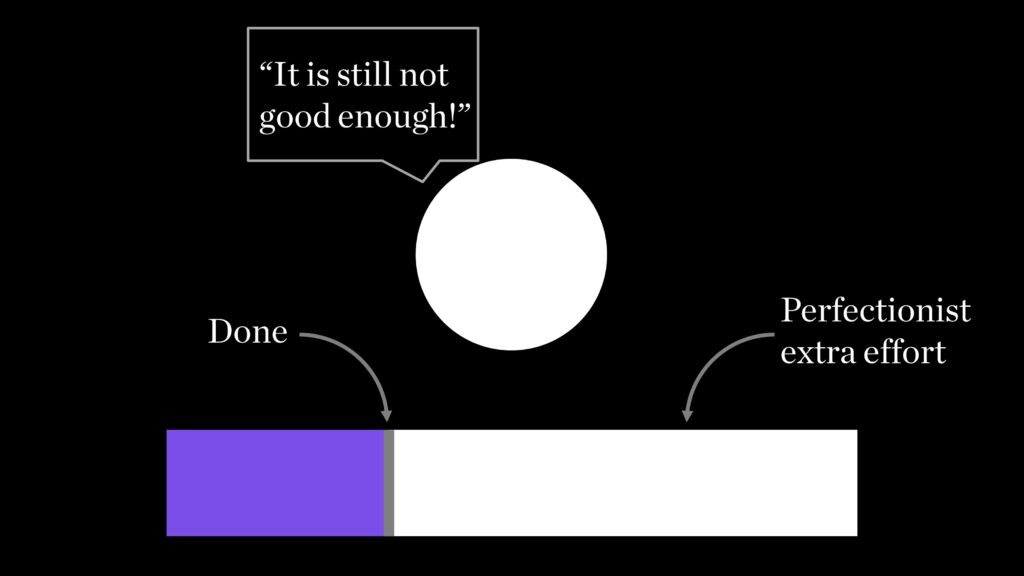
We can become overwhelmed with this perfectionism when it leads us to compare our lives to others.
This kind of thinking can make us feel bad about ourselves and erase any progress we’ve made toward our goals.
When we are unable to meet unrealistic standards, the temptation for perfectionism can lead to cycles of negative self-comparison and feelings of guilt.
To break these cycles, validating mindfulness about our emotions, thoughts, and actions becomes essential for healing from this kind of behavior. Here are three ways you can challenge yourself:
- Acknowledge your accomplishments without judgment;
- Observe how your body reacts when comparing yourself to others;
- Practice being mindful instead of striving for perfection all the time.
By recognizing the validity of mindfulness, we learn to recognize the full potential within ourselves rather than limiting it through destructive behaviors such as perfectionism.
As our understanding deepens, so too does our capacity to heal from this type of patterning – allowing more space for positive growth and flourishing!
Limited potential
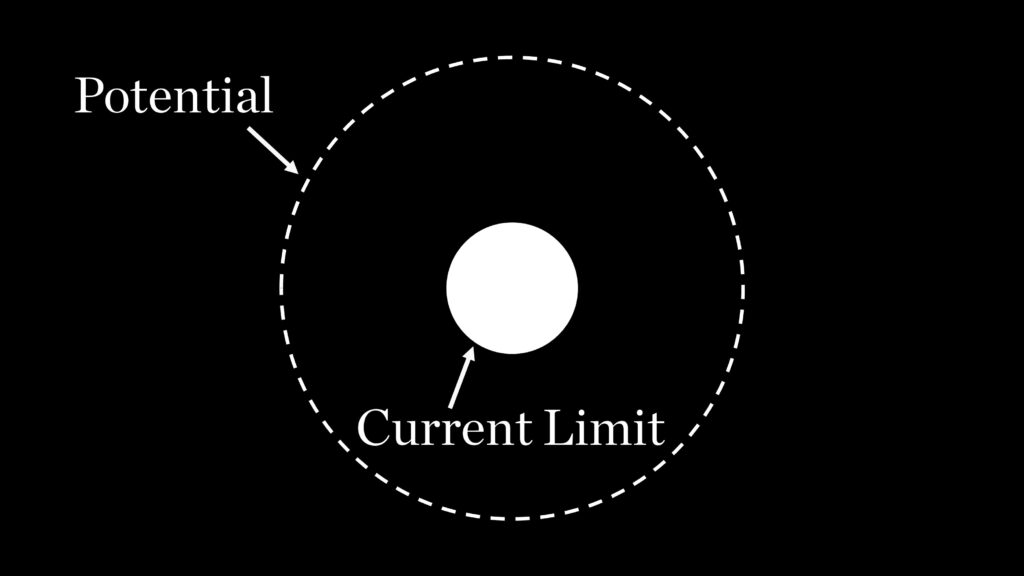
It’s no secret that negative self judgments can be incredibly damaging to our mental health.
Unfortunately, these difficult feelings and anxious thoughts become automatic for many individuals who are struggling with limited potential when it comes to understanding and accepting themselves as they are.
When this happens, we tend to spiral into a cycle of judgmental thoughts about ourselves that only further perpetuate our own dissatisfaction with our lives.
We may start comparing ourselves to others or setting unrealistic standards for ourselves, which leads us down an even more harmful path of constant criticism and feeling inadequate.
This type of thinking prevents us from being able to see beyond the limitations we set on ourselves due to fear or doubt in our abilities.
Other signs of self-judgement
Other signs of self-judgement can include feelings of guilt or shame, difficulty making decisions, and a tendency to be overly critical of oneself.
These feelings can manifest in different ways, such as by avoiding situations that make us feel uncomfortable, by procrastinating, or by an inability to take risks.
Additionally, we may find ourselves constantly questioning our worth or feeling like we are not good enough. All of these are signs that we need to take a step back and practice self-compassion.
Tips for Reducing Self-Judgement
The first step in lessening self-judgment lies in cultivating internal self-awareness. This means being mindful of your thoughts and feelings while staying curious about them rather than automatically reacting or judging them harshly.

It also involves learning how to respond compassionately when you find yourself ruminating over negative thought patterns.
Noticing when these judgments arise gives you an opportunity to pause, acknowledge what’s happening, and shift into feeling kindness toward yourself.
External self-awareness then comes next; as part of practicing greater acceptance of ourselves, we need to become more aware of how others perceive us too.
Taking responsibility for our behavior towards other people will help us start recognizing where we can improve without beating ourselves up along the way.
Furthermore, taking small steps each day and focusing on positive qualities such as resilience can further reduce any sense of shame or guilt associated with past mistakes or missteps.
These two components combined form the foundation for creating healthier relationships, not only with those around us but primarily within ourselves, which leads to a much deeper level of internal peace and stability regardless of external circumstances.
By navigating through moments where judgment arises with patience, curiosity, and care, every person has access to their own capacity for growth and transformation if they are willing to face it head-on.
Now let’s explore how physical health plays an important role in maintaining emotional balance during times of stress.
Taking care of your physical health

The truth of the theory that taking care of one’s physical health is a great way to reduce self-judgement has been demonstrated in numerous studies.
It can be seen, for example, in the improvement of mental wellbeing through activities such as yoga and other forms of exercise.
In particular, those with anxiety are known to benefit from mindfulness-based attention practices during the challenges of daily life challenges.
This improves their actual experience due to increased body awareness and reduced stress levels.
Physical wellness involves more than just engaging in physical activity; it also includes eating healthy foods and getting adequate rest.
For anxious people, this means making sure they give themselves enough time to recover from stressful situations and cultivate positive thoughts about their own bodies by focusing on what makes them unique.
This contributes to the creation of an internal environment in which self-judgment is less likely to take hold, allowing appreciation for oneself to shine through.
By investing in our physical health, we can better manage our emotional responses to life stresses and gain insight into how our minds interact with our bodies as we navigate our daily experiences, ultimately leading us towards greater self-acceptance.
Improving internal and external self-awareness
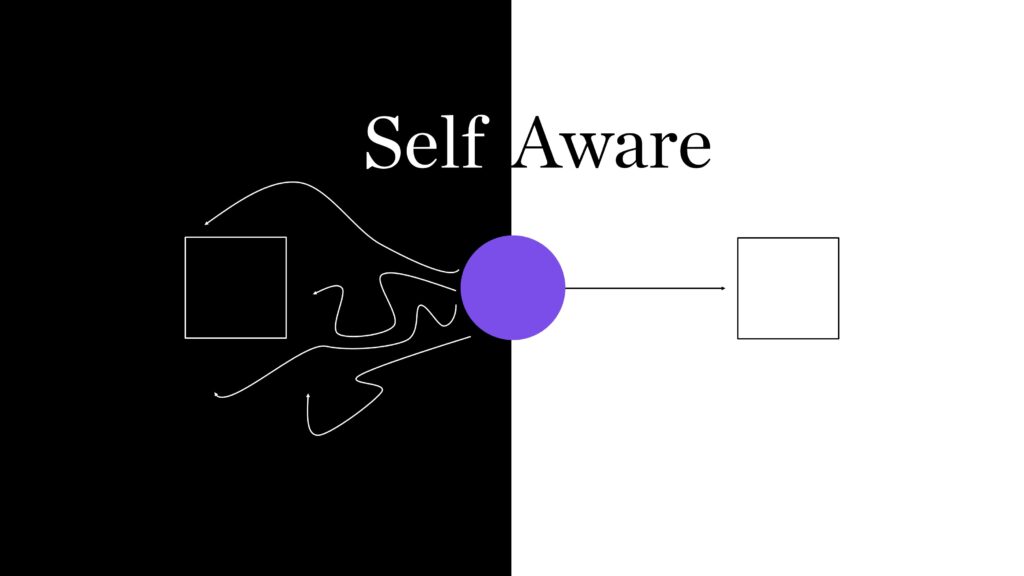
As mentioned above, improving internal and external self-awareness is key to reducing self-judgment. This involves being mindful of our thoughts, feelings, and actions while also taking responsibility for how we interact with the world around us.
By becoming aware of our own patterns of behavior, we can start to recognize where we need to make changes in order to better align with our values and goals.
Sometimes, our inner dialogue is not only unkind to ourselves but also filled with distorted thinking and anxious feelings.
We have all experienced the emotional pain that comes from judging ourselves too harshly or expecting perfection from every action we take.
In order to improve our internal and external self-awareness, it’s important to look at these safety-seeking behaviors and understand where they stem from.
A great way of doing this is by using a conversational attention exercise, which involves having an imaginary conversation between two sides of yourself: one side being your compassionate observer and the other being your critic.
You can use rhetorical devices such as metaphors throughout the conversation in order to help identify any underlying issues that may be causing you distress.
Often times, when we are feeling overwhelmed by negative emotions about ourselves, we forget that there is always an alternate perspective available for us to draw upon.
If we give ourselves permission to slow down and pause for a moment instead of jumping to conclusions too quickly, we can recognize the potential for kindness present in each situation, no matter what arises.
It’s time for us to stop holding onto ideas of guilt and shame. Instead, it’s time to embrace a spirit of self-compassion in order to move forward on our journey towards contentment.
Practicing self-compassion
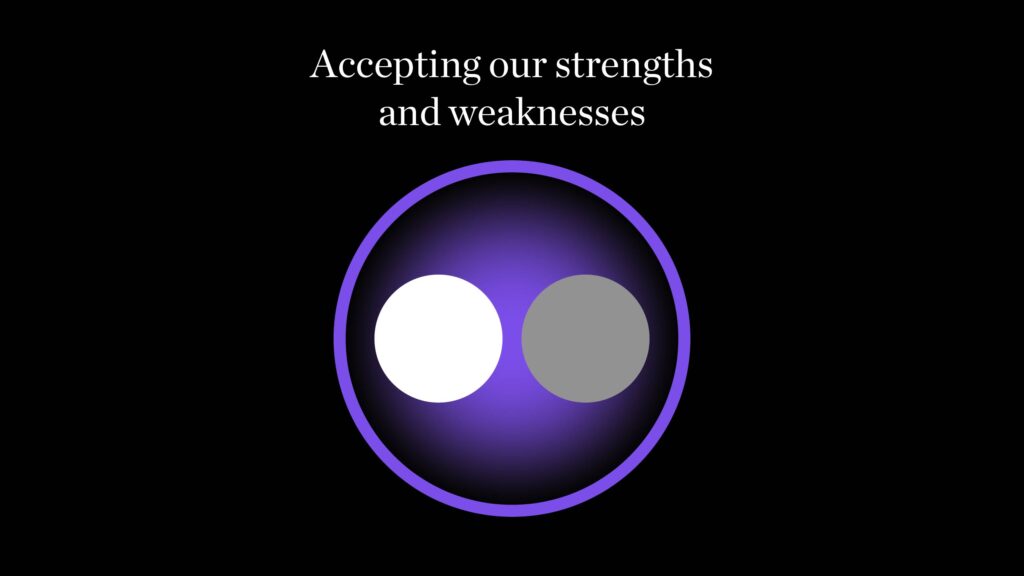
Practicing self-compassion and mindfulness-based attention—being present with our internal experience without judgement—can help us become more aware of our own mental states.
This awareness allows us to recognize the patterns that shape our behavior and begin to explore new ways of relating to ourselves.
We must also remember that we are not alone in this journey; the human experience involves struggling with pain, loss, and disappointment on some level or another.
But as we learn to accept these realities, we can start to rebuild a sense of safety within ourselves despite external conditions.
By recognizing modes of mind associated with depression or anxiety, such as ruminating thoughts or avoidance behaviors, we can begin to move away from unhealthy internal safety-seeking behavior toward something more sustainable and compassionate for ourselves.
In other words, developing self-compassion provides us with an opportunity for growth by allowing us to acknowledge negative experiences without judgment so that they don’t define who we are.
With greater acceptance comes deeper understanding and, ultimately, freedom from any limiting beliefs about ourselves that may have been holding us back.
From here, reframing negative self-talk becomes possible, as does forming healthier relationships between our body, heart, and mind.
Reframing negative self-talk
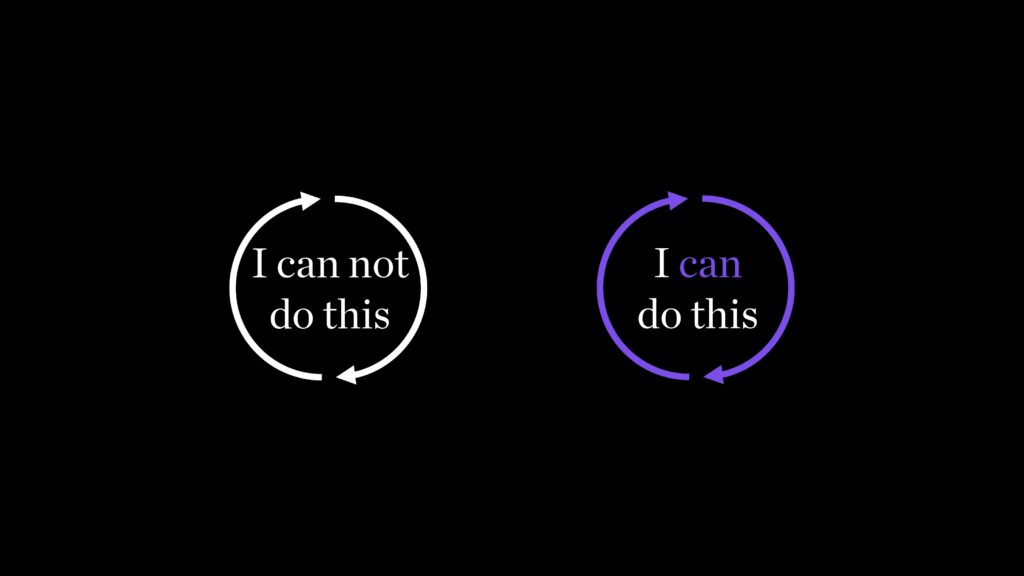
It’s easy to get caught up in the form of judgment that is negative self-talk, but it can be just as simple to reframe our thoughts and create a more healthy attitude.
Being able to recognize how these internal voices predict our own anxiety and fear during challenging experiences is an important skill for demystifying self-judgment. To gain this insight, here are three tips:
Firstly, look at your words objectively instead of emotionally; ask yourself
- “Is this true?”
- “Is there another way I could look at this situation?”
Taking the time to assess what you’re saying will help prevent you from getting overwhelmed by your emotions.
Secondly, try replacing harsh words with kinder ones—rather than telling yourself something is impossible or too difficult, focus on achievable goals like taking one step forward and overcoming any challenge in front of you.
Thirdly, stay away from generalizing statements such as “I always fail”—no matter how many times you have experienced a certain setback before, it doesn’t mean you won’t succeed next time.
These steps provide us with ways to become aware of negative patterns in our thinking so we can begin the process of changing them into positive affirmations.
We all make mistakes; learning how to accept ourselves without judgment allows us space for growth and development.
With practice, we can break down the walls built around us by our fears and anxieties, creating a supportive environment where we don’t need to worry about being judged by ourselves or others.
Creating a supportive environment

Creating a supportive environment is the second step towards demystifying self-judgement. When we think of our judgment term, we may focus on ourselves and forget to include external voices in our thoughts.
But those around us can have just as much influence over how we feel about ourselves. The list of people includes friends, family members, teachers, mentors, or colleagues who shape our perception by providing comfort and reassurance when needed.
We all make mistakes from time to time, and it’s easy to get caught up in bad habits that cause emotional pain.
We’re constantly exposed to negative messages about our worth and abilities, which makes sense given why many of us struggle with low self-esteem.
To build up your confidence again, you need to create an environment where judgmental remarks are not acceptable anymore.
It starts with changing the way you talk to yourself; replacing criticism with kind words will help you break any limiting beliefs imposed by others.
Additionally, be mindful of what kind of feedback you receive from other people—if they offer anything less than positive reinforcement, then ignore them!
Invite only those individuals into your life who truly understand and appreciate who you are; this will provide a strong foundation for developing healthy relationships that foster growth instead of judgment.
So take control of your narrative by creating an atmosphere free from external voices that bring down your spirit and fill it instead with loving support so that you can start building trust in yourself again.
This is essential for achieving long-lasting progress towards demystifying self-judgment once and for all!
Frequently Asked Questions
After explaining the different aspects of self-judgment in the above article, here are some questions that often arise from readers. Hopefully, this section answers them and clarifies things.
How does self-judgment affect our mental health?
Self-judgment can have a significant impact on our mental health. It can lead to feelings of low self-worth, depression, and anxiety.
When we judge ourselves harshly, it can create a cycle of negative thinking that is hard to break out of.
We may become overly critical of ourselves and our actions, leading to feelings of guilt and shame. This can also lead to the avoidance of certain activities or situations, as we fear being judged by others.
Are there any benefits to understanding our own judgements?
Yes, there are many benefits to understanding our own judgements. By recognizing our patterns of judgement, we can begin to identify the underlying causes and work towards changing them.
This can help us become more self-aware and better able to recognize when we are being too hard on ourselves.
We can also learn how to be more compassionate with ourselves and practice self-care. Understanding our own judgements can also help us be more understanding and forgiving of others.
Conclusion
Self judgment is a common phenomenon that is rooted in our need to protect ourselves against harsh judgments from others.
When we judge ourselves harshly, we can spiral into negative thinking, become overly critical of ourselves, or make broad assumptions about how others perceive us based on very little information.
To reduce the habit of self judgment and create a healthier mindset, learn to observe your thoughts with curiosity and compassion, take time for yourself each day to practice mindfulness exercises, engage in creative activities outside your comfort zone, and focus on smaller goals that feel achievable rather than trying to accomplish too much at once.
Additionally, be kinder to yourself when mistakes happen by offering yourself grace instead of punishment or criticism; it will help you develop a sense of self-acceptance as well as resilience in challenging times.
Overall, being aware of your tendency towards self judgements and taking proactive measures towards dealing with it will allow you to make peace with who you are and become more compassionate towards yourself as well as others around you.


